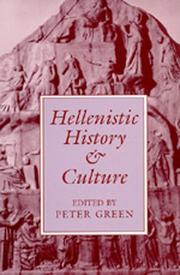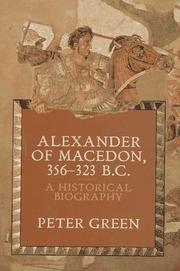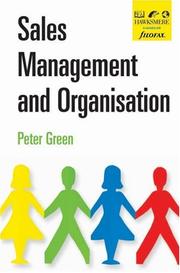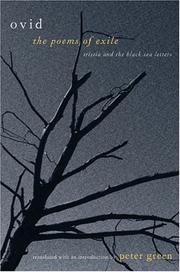| Listing 1 - 8 of 8 |
Sort by
|

ISBN: 0520075641 0520203259 052091709X 0585160309 9780520917095 9780585160306 9780520075641 Year: 1993 Volume: 9 Publisher: Berkeley University of California press
Abstract | Keywords | Export | Availability | Bookmark
 Loading...
Loading...Choose an application
- Reference Manager
- EndNote
- RefWorks (Direct export to RefWorks)
In a 1988 conference, American and British scholars unexpectedly discovered that their ideas were converging in ways that formed a new picture of the variegated Hellenistic mosaic. That picture emerges in these essays and eloquently displays the breadth of modern interest in the Hellenistic Age. A distrust of all ideologies has altered old views of ancient political structures, and feminism has also changed earlier assessments. The current emphasis on multiculturalism has consciously deemphasized the Western, Greco-Roman tradition, and Nubians, Bactrians, and other subject peoples of the time are receiving attention in their own right, not just as recipients of Greco-Roman culture. History, like Herakleitos' river, never stands still. These essays share a collective sense of discovery and a sparking of new ideas--they are a welcome beginning to the reexploration of a fascinatingly complex age.
Hellenism --- Hellenism. --- Hellénisme --- Congresses --- Congrès --- Greece --- Regions & Countries - Europe --- History & Archaeology

ISBN: 0520954696 9780520954694 0520071654 9780520071650 0520071662 9780520071667 Year: 1991 Publisher: Berkeley University of California Press
Abstract | Keywords | Export | Availability | Bookmark
 Loading...
Loading...Choose an application
- Reference Manager
- EndNote
- RefWorks (Direct export to RefWorks)
Until recently, popular biographers and most scholars viewed Alexander the Great as a genius with a plan, a romantic figure pursuing his vision of a united world. His dream was at times characterized as a benevolent interest in the brotherhood of man, sometimes as a brute interest in the exercise of power. Green, a Cambridge-trained classicist who is also a novelist, portrays Alexander as both a complex personality and a single-minded general, a man capable of such diverse expediencies as patricide or the massacre of civilians. Green describes his Alexander as "not only the most brilliant (and ambitious) field commander in history, but also supremely indifferent to all those administrative excellences and idealistic yearnings foisted upon him by later generations, especially those who found the conqueror, tout court, a little hard upon their liberal sensibilities. "This biography begins not with one of the universally known incidents of Alexander's life, but with an account of his father, Philip of Macedonia, whose many-territoried empire was the first on the continent of Europe to have an effectively centralized government and military. What Philip and Macedonia had to offer, Alexander made his own, but Philip and Macedonia also made Alexander form an important context for understanding Alexander himself. Yet his origins and training do not fully explain the man. After he was named hegemon of the Hellenic League, many philosophers came to congratulate Alexander, but one was conspicuous by his absence: Diogenes the Cynic, an ascetic who lived in a clay tub. Piqued and curious, Alexander himself visited the philosopher, who, when asked if there was anything Alexander could do for him, made the famous reply, "Don't stand between me and the sun." Alexander's courtiers jeered, but Alexander silenced them: "If I were not Alexander, I would be Diogenes." This remark was as unexpected in Alexander as it would be in a modern leader. For the general reader, the book, redolent with gritty details and fully aware of Alexander's darker side, offers a gripping tale of Alexander's career. Full backnotes, fourteen maps, and chronological and genealogical tables serve readers with more specialized interests.
Generals --- Alexander, --- Alejandro, --- Alekjhāṇḍara, --- Aleksandar, --- Aleksander, --- Aleksandr, --- Alekʻsandre, --- Aleksandros bar Filipos, --- Aleksandŭr, Makedonski, --- Alessandro, --- Alexander --- Alexandre, --- Alexandros --- Alexandros, --- Alexandros, Megalos, --- Alexandru, --- Alexantros, --- Aleksandŭr, --- Александър, --- Iskandar, --- Maḳdonya, Aleksandros bar Filipos, --- Makedonski, Aleksandŭr, --- Македонски, Александър, --- Megalexandros, --- Megas Alexandros, --- Nagy Sándor, --- Sikandar, --- Iskender, --- Μέγας Ἀλέξανδρος, --- Ἀλέξανδρος, --- Ἀλέξανδρος --- אלכסנדר בן פיליפוס, --- אלכסנדר, --- اسكندر كبير --- اسکندر اعظم --- سکندراعظم --- Greece --- Macedonia --- History --- Kings and rulers --- Generals - Greece - Biography. --- administrative excellences. --- alexander the great. --- ancient greece. --- ancient greek history. --- ancient history. --- ancient world. --- biographies. --- biography. --- centralized government. --- classical history. --- classical studies. --- complex personality. --- diogenes the cynic. --- european history. --- famous generals. --- greco roman history. --- greece. --- greek and roman studies. --- greek history. --- gritty details. --- history. --- liberal sensibilities. --- macedonia. --- military history. --- philip of macedonia. --- political history. --- political science. --- romantic figure. --- world history. --- Biography.

ISBN: 185418167X 9786610233564 1280233567 1854185764 Year: 1999 Publisher: London : Hawksmere,
Abstract | Keywords | Export | Availability | Bookmark
 Loading...
Loading...Choose an application
- Reference Manager
- EndNote
- RefWorks (Direct export to RefWorks)
Sales effectiveness is a key issue in businesses that deploy sales teams because of high salary and wage costs. This guide shows how to manage time more effectively, plan and monitor performance, develop the customer base and track progress.
Sales management. --- Sales promotion. --- Selling. --- Management, Sales --- Industrial management --- Marketing --- Selling
Book
ISBN: 0520966872 9780520966871 0520293630 9780520293632 Year: 2018 Publisher: Oakland, California : University of California Press,
Abstract | Keywords | Export | Availability | Bookmark
 Loading...
Loading...Choose an application
- Reference Manager
- EndNote
- RefWorks (Direct export to RefWorks)
"This is a translation of the epic Greek poem by Homer."--Provided by publisher.
E-books --- Epic poetry, Greek --- Epic poetry, Greek. --- POETRY --- Ancient, Classical & Medieval. --- Odysseus, --- Odaiséas, --- Odisej, --- Odiseja, --- Odisėjas, --- Odisejs, --- Odiseo, --- Odiseu, --- Odissea, --- Odisseas, --- Odisseu, --- Odisseus, --- Odissey, --- Odusseus, --- Odüsszeusz, --- Odyseusz, --- Odyssevs, --- Odyseus, --- Odysews, --- Ódysseifur, --- Oliseus, --- Olisseus, --- Oylixeus, --- Olytteus, --- Ulises, --- Ulisse, --- Ulissi, --- Ulixes, --- Ulysse, --- Ulysses, --- Utuze, --- Οδυσσέας, --- Ὀδυσσεύς, --- Ὀλισεύς, --- Ὀλισσεύς, --- Ὀλυττεύς, --- Οὐλιξεύς, --- אודיסאוס, --- オデュッセウス, --- 奥德修斯, --- 오디세우스, --- أوديسيوس, --- Адысей, --- Одисеј, --- Одисей, --- Одіссей, --- Одиссей, --- LITERARY CRITICISM / Ancient & Classical --- action. --- adventure. --- amazons. --- ancient greece. --- ancient world. --- antiquity. --- battles. --- betrayal. --- classic literature explained. --- classic literature. --- classic story. --- cyclops. --- explained. --- explorer. --- greek poetry. --- guided reading. --- homer. --- maps. --- mythology. --- notes. --- odysseus. --- oral tradition. --- reading guide. --- reading questions. --- sirens. --- study guide. --- survival. --- temptation. --- translation. --- trojan war. --- vengeance.

ISBN: 0520931378 9780520931374 0520242602 9780520242609 0140444076 9780140444070 1322401543 Year: 2005 Publisher: Berkeley University of California Press
Abstract | Keywords | Export | Availability | Bookmark
 Loading...
Loading...Choose an application
- Reference Manager
- EndNote
- RefWorks (Direct export to RefWorks)
In the year A.D. 8, Emperor Augustus sentenced the elegant, brilliant, and sophisticated Roman poet Ovid to exile-permanently, as it turned out-at Tomis, modern Constantza, on the Romanian coast of the Black Sea. The real reason for the emperor's action has never come to light, and all of Ovid's subsequent efforts to secure either a reprieve or, at the very least, a transfer to a less dangerous place of exile failed. Two millennia later, the agonized, witty, vivid, nostalgic, and often slyly malicious poems he wrote at Tomis remain as fresh as the day they were written, a testament for exiles everywhere, in all ages. The two books of the Poems of Exile, the Lamentations (Tristia) and the Black Sea Letters (Epistulae ex Ponto), chronicle Ovid's impressions of Tomis-its appalling winters, bleak terrain, and sporadic raids by barbarous nomads-as well as his aching memories and ongoing appeals to his friends and his patient wife to intercede on his behalf. While pretending to have lost his old literary skills and even to be forgetting his Latin, in the Poems of Exile Ovid in fact displays all his virtuoso poetic talent, now concentrated on one objective: ending the exile. But his rhetorical message falls on obdurately deaf ears, and his appeals slowly lose hope. A superb literary artist to the end, Ovid offers an authentic, unforgettable panorama of the death-in-life he endured at Tomis.
Poets, Latin --- Epistolary poetry, Latin --- Complaint poetry, Latin --- Exiles --- Romans --- Ethnology --- Italic peoples --- Latini (Italic people) --- Latin complaint poetry --- Latin poetry --- Latin poets --- Ovid, --- Nasó, P. Ovidi, --- Naso, Publius Ovidius, --- Nazon, --- Ouidio, --- Ovide, --- Ovidi, --- Ovidi Nasó, P., --- Ovidiĭ, --- Ovidiĭ Nazon, Publiĭ, --- Ovidio, --- Ovidio Nasón, P., --- Ovidio Nasone, Publio, --- Ovidios, --- Ovidiu, --- Ovidius Naso, P., --- Owidiusz, --- P. Ovidius Naso, --- Publiĭ Ovidiĭ Nazon, --- Publio Ovidio Nasone, --- Ūvīd, --- אוביד, --- Constanța (Romania) --- Tomes (Romania) --- Constantza (Romania) --- Kustenji (Romania) --- Kustendjie (Romania) --- Constanța, Romania (City) --- Tomis (Romania) --- Tomi (Romania) --- Κωνστάντζα (Romania) --- Kōnstantza (Romania) --- Κωνστάντια (Romania) --- Kōnstantia (Romania) --- Кюстенджа (Romania) --- Ki︠o︡stendzha (Romania) --- Констанца (Romania) --- Konstant︠s︡a (Romania) --- Köstence (Romania) --- Ovid --- Ovidius Naso, Publius, --- ancient mediterranean. --- ancient rome. --- ancient world. --- augustus. --- banned books. --- barbarians. --- black sea letters. --- black sea. --- censorship. --- classical literature. --- classicism. --- classics. --- constantza. --- empire. --- epics. --- epistulae ex ponto. --- exile. --- lamentations. --- latin literature. --- latin. --- letters. --- literary criticism. --- literature. --- nomads. --- ovid. --- poems of exile. --- poet. --- poetry. --- political prisoner. --- raids. --- rhetoric. --- roman empire. --- roman literature. --- roman poetry. --- romania. --- rome. --- theocratic age. --- tomis. --- tristia. --- violence. --- war.
Book
ISBN: 0520281438 0520961323 9780520961326 9780520281417 0520281411 9780520281431 1336100915 Year: 2015 Publisher: Oakland, California
Abstract | Keywords | Export | Availability | Bookmark
 Loading...
Loading...Choose an application
- Reference Manager
- EndNote
- RefWorks (Direct export to RefWorks)
One of the oldest extant works of Western literature, the Iliad is a timeless epic poem of great warriors trapped between their own heroic pride and the arbitrary, often vicious decisions of fate and the gods. Renowned scholar and acclaimed translator Peter Green captures the Iliad in all its surging thunder for a new generation of readers. Featuring an enticingly personal introduction, a detailed synopsis of each book, a wide-ranging glossary, and explanatory notes for the few puzzling in-text items, the book also includes a select bibliography for those who want to learn more about Homer and
Trojan War --- Epic poetry, Greek. --- Greek epic poetry --- Epic poetry, Classical --- Greek poetry --- Achilles --- Achìe --- Achilas --- Achille --- Achilleus --- Achilli --- Ahil --- Ahile --- Ahilej --- Ahillejs --- Aĥilo --- Aichill --- Akhilles --- Akhilleus --- Akhilleusz --- Akiles --- Akili --- Akille --- Akilles --- Akkilles --- Aquiles --- Aquilles --- Axill --- Axilles --- Ἀχιλλεύς --- آخيل --- アキレウス --- Akireusu --- 아킬레우스 --- 阿喀琉斯 --- Ахіл --- Ахил --- Ахилл --- Akhill --- Ахіллес --- אכילס --- Akhiles --- Epic poetry, Greek --- Achilles (Greek mythology) --- Achilles (Greek mythology) -- Poetry. --- Trojan War -- Poetry. --- Mythology, Greek --- achilles. --- aeneas. --- agamemnon. --- ancient classics. --- ancient greece. --- ancient mythology. --- annotated homer. --- annotated iliad. --- classic fiction. --- classic literature. --- classical antiquity. --- epic poem. --- epic poetry. --- epics. --- greek antiquity. --- greek epic. --- greek gods. --- greek literature. --- greek myth. --- greek mythology. --- homer. --- homeric tradition. --- iliad and odyssey. --- iliad. --- judgement of paris. --- kleos. --- menelaus. --- nostos. --- odysseus. --- poeme vivant. --- poetry. --- trojan war. --- troy. --- world lit.
Book
ISBN: 128369591X 0520953754 9780520953758 0520274326 9780520274327 Year: 2012 Publisher: Berkeley University of California Press
Abstract | Keywords | Export | Availability | Bookmark
 Loading...
Loading...Choose an application
- Reference Manager
- EndNote
- RefWorks (Direct export to RefWorks)
The so-called first war of the twenty-first century actually began more than 2,300 years ago when Alexander the Great led his army into what is now a sprawling ruin in northern Afghanistan. Frank L. Holt vividly recounts Alexander's invasion of ancient Bactria, situating in a broader historical perspective America's war in Afghanistan.
HISTORY / Ancient / General. --- Alexander, --- Alejandro, --- Alekjhāṇḍara, --- Aleksandar, --- Aleksander, --- Aleksandr, --- Alekʻsandre, --- Aleksandros bar Filipos, --- Aleksandŭr, Makedonski, --- Alessandro, --- Alexander --- Alexandre, --- Alexandros --- Alexandros, --- Alexandros, Megalos, --- Alexandru, --- Alexantros, --- Aleksandŭr, --- Александър, --- Iskandar, --- Maḳdonya, Aleksandros bar Filipos, --- Makedonski, Aleksandŭr, --- Македонски, Александър, --- Megalexandros, --- Megas Alexandros, --- Nagy Sándor, --- Sikandar, --- Iskender, --- Μέγας Ἀλέξανδρος, --- Ἀλέξανδρος, --- Ἀλέξανδρος --- אלכסנדר בן פיליפוס, --- אלכסנדר, --- اسكندر كبير --- اسکندر اعظم --- سکندراعظم --- Greece --- Afghanistan --- History --- History. --- afghanistan history. --- alexander the great. --- ancient afghanistan. --- ancient history. --- asian history. --- book club reads. --- books for history lovers. --- culture of bactria. --- discussion books. --- distractions for kids. --- easy to read. --- engaging. --- hellenistic culture. --- history of afghan culture. --- history of bactria. --- history of empires. --- history of kings. --- how alexander the great gained power. --- leisure reads. --- nonfiction. --- page turner. --- quarantine books. --- reign of alexander the great. --- vacation books. --- war history. --- warfare. --- what is bactria.
Book
ISBN: 0520934717 9780520934719 Year: 2008 Publisher: Berkeley University of California Press
Abstract | Keywords | Export | Availability | Bookmark
 Loading...
Loading...Choose an application
- Reference Manager
- EndNote
- RefWorks (Direct export to RefWorks)
A lively combination of scholarship and unorthodoxy makes these studies in ancient history and literature unusually rewarding. Few of the objects of conventional admiration gain much support from Peter Green (Pericles and the "democracy" of fifth-century Athens are treated to a very cool scrutiny) but he has a warm regard for the real virtues of antiquity and for those who spoke with "an individual voice."The studies cover both history and literature, Greece and Rome. They range from the real nature of Athenian society to poets as diverse as Sappho and Juvenal, and all of them, without laboring any parallels, make the ancient world immediately relevant to our own. (There is, for example, a very perceptive essay on how classical history often becomes a vehicle for the historian's own political beliefs and fantasies of power.) The student of classical history will find plenty in this book to enrich his own studies. The general reader will enjoy the vision of a classical world which differs radically from what he probably expects.
Civilization, Ancient. --- Ancient civilization --- Greece --- Civilization --- ancient greece. --- ancient history. --- ancient rome. --- ancient world. --- classical world. --- contemporary historians. --- criticism. --- democracy. --- essays. --- global influence. --- global literature. --- greece. --- greek history. --- greek society. --- historians. --- historical commentary. --- history and literature. --- history students. --- history. --- juvenal. --- literary criticism. --- modern historiography. --- nonfiction. --- parthenon. --- poetry. --- power struggle. --- roman history. --- roman society. --- sappho. --- scholars. --- world history. --- world literature.
| Listing 1 - 8 of 8 |
Sort by
|

 Search
Search Feedback
Feedback About UniCat
About UniCat  Help
Help News
News